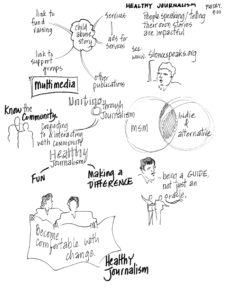Convener: Jane Elle Stevens
Reporter: Florangela Davila
Participants: Dan Gillmor, Eric Nelson, Stephen Silha, Linda Grdina, Florangela Davila
Discussion
“News orgs. aren’t connected/aware of the community/public.
“So how does a community become part of the journalism organization?
“Calls to a newsroom from the public don’t even/always get answered.
“What about an ombudsman?
“News orgs. are too motivated by the bottom line. Can we persuade management to accept lower profit margins??
“Yes. Look at something like the Center for Public Integrity that’s doing investigative work and is non-profit funded.
“Look at the Lawrence World Journal.
“High profits don’t necessarily translate into good journalism.
(But money matters).
“The reality: It’s a lot more fun to be part of something that’s growing vs, something that’s breaking.
“Look at the pay of journalists. They can’t even live and function in the city/ies they cover.
“News org. talk about their “readers.” But ‘readers’ doesn’t necessarily translate into The Community.
“What is a healthy organization? Is academia healthier?
No. J Schools might as well be microcosms of traditional newsrooms.
“A colleague once said: Journalists are all insecure and they all want to have fun and make a difference.
“What about nurturing one another? Finding people who share your spirit/mission/goals. Cultivate “healthy pods” in the newsroom. Maybe that’s how an individual journalist might grow.
“The only resource we have might be each other.
“Until there’s a culture or acceptance of taking a risk nothing is going to change (in news orgs).
“Look at Silicon Valley where if you fail and you fail well, it’s still attractive.
“Look at how Silicon Valley has incorporated/accepted Change as part of its culture.
“There’s no Research and Development in newspapers.
“There’s no risk taking.
“Look at what’s happening at the Oakland Tribune. We took 14 people and we’ve changed it into a webcentric newsroom. Journalists are taking cameras out, which forces them to get out of the newsroom, to talk to people face to face. It’s like a bolt of electricity. They’re out there now and they’re engaged.
“You can still have depth in multimedia.
“I don’t believe journalists need to be bloggers but the community needs to be bloggers.
“Newspapers are still reluctant to point to elsewhere (link to other websites).
“Look at BBC. They link to everything.
“Look at how there’s a divide: alternative media vs. indie vs. mainstream.
There ought to be something uniting everyone. We all have a common purpose.
“Print and TV has been problem oriented.
Look at the Internet: It’s solution oriented.
“Journalism is a guide, not just an oracle.
“A new model to explore: mass media going hyper-local, largely written by the community. It could be a good business model. You could give people some training. Give community the tools by which it can cover itself.
What’s the bridge to these solutions? The journalist, I think.
